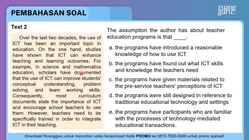Iklan
Pertanyaan
The following text is for question 79- 82
Text 2
Over the last two decades, the use of ICT has been an important topic in education. On the one hand, studies have shown that ICT can enhance teaching and learning outcomes. For example, in science and mathematics education, scholars have documented that the use of ICT can improve students' conceptual understanding, problem solving, and team working skills. Consequently, most curriculum documents state the importance of ICT and encourage school teachers to use them. However, teachers need to be specifically trained in order to integrate ICT in their teaching.
Schools are known to be resistant to innovation and change. However, the spread of ICT is beginning to affect how teachers teach. One of the current issues about the use of ICT is how it is integrated into the curriculum. The curriculum documents provide arguments for introducing ICT in the school setting. Therefore, schools expect that graduates from teacher education programs have a reasonable knowledge of how to use ICT. However, this may not be the case because most current teachers' pre-service preparation and subsequent in-service courses were designed by using traditional educational technology and settings. Thus, the participants in these courses are not familiar with the processes, interaction patterns, features and possibilities of teaching learning processes based on ICT.
This issue becomes complicated because the students' thinking skills are often weak. Also, they typically lack information literacy skills although they were born in or after 1982. In addition, they belong to the "Net Generation': Furthermore, they are accustomed to operating in a digital environment for communication, information gathering, and analysis. The problem is that students do not have to understand how their use of technology affects their habits of learning.
Effective development of pre-service teachers' ICT proficiency does not seem to be a direct process, but is the one asking for a careful, complex approach. First, a needs assessment is important to find out what ICT skills and knowledge teachers need at schools. Second, designers of teacher education programs should know the pre-service teachers' perceptions of ICT and their attitudes toward ICT integration into curriculum. Third, teacher education programs need to consider the two typical arguments that support the ICT use in schools.
Diadaptasi dari: http://www.jclt.ca/index.php./jclt/article/view/498/229
The assumption the author has about teacher education programs is that ____.
The assumption the author has about teacher education programs is that ____.
The programs have introduced a reasonable knowledge of how to use ICT
The programs have found out what ICT skills and knowledge the teachers need
The programs have given materials related to the pre-service teachers' perceptions of ICT
The programs were still designed in reference to traditional educational technology and settings
The programs have participants who are familiar with the processes of technology-mediated educational transactions.
Iklan
N. Puspita
Master Teacher
5
3.0 (2 rating)
Iklan
Pertanyaan serupa
RUANGGURU HQ
Jl. Dr. Saharjo No.161, Manggarai Selatan, Tebet, Kota Jakarta Selatan, Daerah Khusus Ibukota Jakarta 12860
Produk Ruangguru
Bantuan & Panduan
Hubungi Kami
©2026 Ruangguru. All Rights Reserved PT. Ruang Raya Indonesia

















